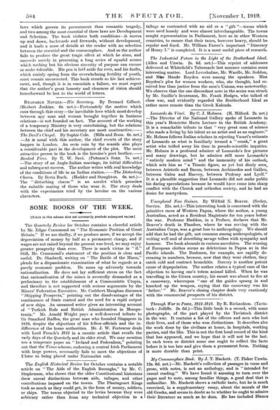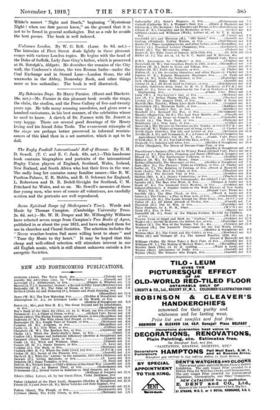SOME BOOKS OF THE WEEK.
[Notice in this column does not necessarily preclude subsequent revisit.] The Quarterly Review for October contains a cheerful article by Mr. Edgar Crammond on " The Economic Position of Great Britain." If we are thrifty, if we produce more, if we accept the depreciation of money by half as a permanent charge, and if wages are not raised beyond the present war-level, we may enjoy greater prosperity than ever. There is much virtue in " if." Still, Mr. Crammond's statement of the position is clear and useful. Dr. Shadwell, writing on The Battle of the Mines," pleads for a dispassionate examination of what he regards as a purely economic problem. He sums up adversely towards nationalization. He does not lay sufficient stress on the fact that nationalization of the mines is avowedly demanded as a preliminary to the establishment of a Communistic Utopia, and therefore is not supported with serious arguments by the
➢ liners' Federation Executive. Mr. Cuthbert Maughan discusses " Shipping Prospects," pointing out the disadvantages of the continuance of State control and the need for a rapid output of new ships. An unnamed writer gives an interesting account of " Turkish Rule and British Administration in Mesopotamia." Mr. Arnold Wright pays a well-deserved tribute to Sir Stamford Raffles, the great man who founded Singapore in 1819, despite the objections of his fellow-officials and the indifference of the home authorities. Mr. J. W. Fortescue deals with Lord French's 1914 in a caustic article that recalls the early days of the Quarterly and its elder rival. We may mention too a temperate paper on " Ireland and Federalism," pointing out that the Times scheme, endowing a central Irish Parliament with large powers, necessarily fails to meet the objections of Ulster to being placed under Nationalist rule.
The English Historical Review for October contains a notable article on " The Aids of the English Boroughs," by Mr. C. Stephenson, who shows that the older Constitutional historians drew unreal distinctions between aids, tallages, and other contributions imposed on the towns. The Plantagenet Kings took as much as they could get, in the form of money, soldiers, or ships. The towns objected to the levies because they were arbitrary rather than from any technical objection to a tallage as contrasted with an aid or a " gift "—terms which were used loosely and were almost interchangeable. The towns sought representation in Parliament, here as in other Western countries, to ensure that their taxes, however heavy, should be regular and fixed. Mr. William Farrer's important " Itinerary of Henry I." is completed. It is a most useful piece of research.
The Industrial Future in the Light of the Brotherhood Ideal. (Allen and Unwin. 2s. 6d. net.)—This reprint of addresses delivered at Whitefield's Tabernacle last summer contains some interesting matter. Lord Leverhulme, Mr. Wardle, Mr. Seddon, and Miss Maude Royden were among the speakers. Miss Royden's plea for women workers, who, she thought, had re. ceived less than justice from the men's Unions, was noteworthy. We observe that the one discordant note in the series was struck by Mr. Smillie's lieutenant, Mr. Frank Hodges, who talked of class war, and evidently regarded the Brotherhood Ideal as rather more remote than the Greek Kalends.
Leonardo da Vinci. By C. J. Holmes. (H. Milford. 2s. net.) —The Director of the National Gallery spoke of Leonardo in this year's Henrietta Hertz Lecture to the British Academy. It is a remarkable tribute to that " very great man of science who made a living by his talent as an artist and as an engineer." Mr. Holmes follows Italian scholars in rejecting Vasari's estimate of Leonardo as what is familiarly termed a " crank," a great artist who trifled away his time in pseudo-scientific inquiries. Mr. Holmes is a profound admirer of Leonardo's few pictures and many drawings, but he admires still more Leonardo's " entirely modern mind " and the immensity of his outlook, which sets him as " a Titanic figure, as yet but dimly seen, between Aristotle and Bacon, between Archimedes and Galileo, between Galen and Harvey, between Ptolemy and Lyell." It is a plausible suggestion that Leonardo did not make public his daring speculations because he would have come into sharp conflict with the Church and orthodox society, and he had no desire for martyrdom.
Unexplored New puinea. By Wilfrid N. Beaver. (Seeley, Service. 25s. net.)—This interesting book is concerned with the primitive races of Western Papua, where the author, a young Australian, acted as a Resident Magistrate for ton years before the war. Professor Haddon, in a Preface, declares that Mr. Beaver's death in Flanders, where he was serving with the Australian Corps, was a great loss to anthropology. We should add that he had the gift, not common among anthropologists, of writing well and of describing savage tribes with sympathy and humour. The book abounds in curious anecdotes. The wearing of European clothes seems as deleterious in Papua as in the Pacific islands. The Bushmen, for example, are rapidly decreasing in numbers, because, now that they wear clothes, they catch cold and contract bronchitis. Sorcery is another potent cause of depopulation. The author relates a typical case of the objection to having one's totem animal killed. When he was travelling in the Girara country, his escort was about to fire at a cassowary, whereupon " one of the guides sprang in and knocked up the weapon, crying that the cassowary was his ' father.' " Mr. Beaver's closing chapter deals very cautiously with the commercial prospects of his district.
Through War to Peace, 1914-1918. By R. Richardson. (Tavistock : Jolliffe. 2s. 6d.)—This little book is a record, with some photographs, of the part played by the Tavistock district in the war. It contains a list of the officers and men who lost their lives, and of those who won distinctions. It describes also the work done by the civilians at home, in hospitals, working parties, and the like. This is not the first local record of the kind that has appeared, and we hope that it will not be the last. In each town or district some one ought to collect the facts before it is too late and give them a permanent form. Nothing is more durable than print.
My Commonplace Book. By J. T. Hackett. (T. Fisher Unwin. 12s. lid. net.)—Mr. Hackett's collection of passages in verse and prose, with notes, is not an anthology, and is " intended for casual reading." We have found it amusing to turn over the pages and to note, among familiar things, a good deal that is unfamiliar. Mr. Hackett shows a catholic taste, but he is much exercised, in a supplementary essay, about the morals of the old Greeks, and seems in doubt as to whether he ought to admire their literature as much as he does. He has included Blanco White's sonnet " Night and Death," beginning " Mysterious Night ! when our first parent knew," on the ground that it is not to be found in general anthologies. But as a rule he avoids the best poems. The book is well indexed.
Unknown London. By W. G. Bell. (Lane. 6s. 6d. net.)— The historian of Fleet Street deals lightly in these pleasant essays with various London topics. He begins with the head of the Duke of Suffolk, Lady Jane Grey's father, which is preserved at St. Botolph's, Aldgate. He describes the remains of the City wall, the Confessor's shrine, the two Roman baths—under the Coal Exchange and in Strand Lane—London Stone, the old waxworks in the Abbey, Domesday Book, and other things more or less unfamiliar. The book is well illustrated.
My Bohemian Days. By Harry Furniss. (Hurst and Blackett. 16e. net.)—Mr. Furniss in this pleasant book recalls the stage, the clubs, the studios, and the Press Gallery of five-and-twenty years ago. He tells many amusing anecdotes, and gives over a hundred caricatures, in his best manner, of the celebrities whom lie used to know. A sketch of Dr. Farmer with Dr. Jowett is very happy. There are several good drawings of Sir Henry Irving and his friend John Toole. The evanescent triumphs of the stage are perhaps better preserved in informal reminiscences of this kind than in a set narrative, which is apt to be dull.
The Rugby Football Internationals' Roll of Honour. By E. H. D. Sewell. (T. C. and E. C. Jack. 42s. net.)—This handsome book contains biographies and portraits of the international Rugby Union players of England, Scotland, Wales, Ireland, New Zealand, and South Africa who lost their lives in the war. The sadly long list contains many familiar names—like R. W. Poulton-Palmer, E. R. Mobbs, and R. 0. Schwarz for England, L. Robertson and D. R. Bedell-Sivright for Scotland, C. M. Pritchard for Wales, and so on. Mr. Sewell's memoirs of these fine young men, who were of course all volunteers, are carefully written and the portraits are well reproduced.
Seven Spiritual Songs (of Shakespeare's Time). Words and Music by Thomas Campion. (Cambridge University Press. 2s. 6d. net.)—Mr. W. H. Draper and Mr. Willoughby Williams have selected seven songs from Campion's Two Books of Ayres, published in or about the year 1613, and have adapted them for use in churches and Choral Societies. The selection includes the " Never weather-beaten Sail more willing bent to shore " and " Tune thy Music to thy heart." It may be hoped that this cheap and well-edited selection will stimulate interest in our old English music, which is still almost unknown outside a few energetic Societies.







































 Previous page
Previous page